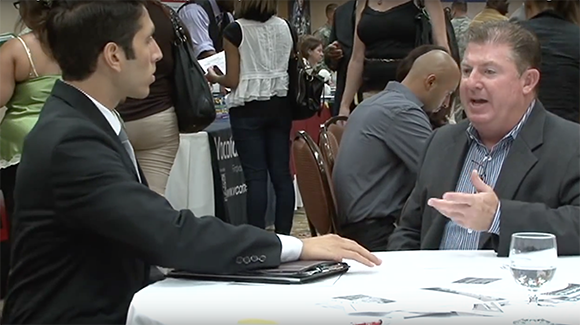
(Photo Credit: John Guenther/CA Fwd)
Mastery of non-technical abilities like communication and empathy can make a dramatic difference for those seeking employment.
To upgrade the “soft skills” of California students, a new training curriculum is now available to all 113 of the state's community colleges. The comprehensive program, called New World of Work (NWOW) has been officially endorsed by the California Community College Chancellor’s Office after four years of development.
“Employers depend on human qualities that can’t be duplicated by automation,” said Rajinder Gill, director of 21st Century Skills projects at NWOW. Having a workforce with a better set of soft skills can improve business outcomes in nearly all industries.
The innovative training program is an endeavor started at Feather River College with an investigation into the needs of employers. Since its launch, NWOW has evolved over time to meet the demands of employers in both the traditional and emerging economies.
“We have a top 10 list of essential employability skills that are required of workers in the emerging global economy – dubbed the 'knowledge' or 'human' economy,” said Gill. “These are the emotional intelligence skills that are indispensable to employers in the 21st century – skills that can't be automated, like empathy, communication and adaptability.”
Students and employers are both benefiting from the program. Take Adrian Luna, a young man who spent time in prison after being convicted of a felony. He struggled to find a job after serving his time. He settled for a low-skill job and set to work learning marketable skills in a fabrication course in an auto technology program at Hartnell College, one of the original pilot colleges in the New World of Work program. While the technical training was helpful, Luna said the NWOW learning was what really made a difference for him.
Luna said the course “changed his life” and taught him how to “deal with his past and changed his ability to speak to people without second-guessing himself.” The training he received through the NWOW 21st Century Skills lessons helped him ace a job interview and show up ready to work with more than just a set of technical skills.
NWOW training is so successful, in part, because of the rigorous development process Gill has pursued. In 2012, Gill and her New World of Work co-creator, Amy Schulz, convened panels composed of employers, human resources specialists, entrepreneurs and students to help identify the right content for the program. Next, the team developed a curriculum and launched a pilot program at Feather River College.
The NWOW curriculum includes two lessons of 45-60 minutes on each of the ten skills for a total of 20 classes or modules. The topic areas are titled Adaptability, Analysis/Solution Mindset, Collaboration, Communication, Digital Fluency, Empathy, Entrepreneurship Mindset, Resilience, Self-Awareness, and Social/Diversity Awareness.
NWOW grew their reach in 2015, by introducing the pilot program to 10 California community colleges, the National Association for Community College Entrepreneurship, and the California Department of Human Resources. More recently they expanded the pilot to 13 California community colleges and shared their work with Mozilla, California Corporate College Partnerships, and MDRC, a nonprofit, nonpartisan education and social policy research organization.
The flexibility of the material contributes to its adoption in many different situations. Workforce development and investment boards, community organizations, and government agencies dedicated to improving job placement and preparedness – including community colleges – send instructors to the two-day training courses to learn the curriculum and engage in hands-on practice to teach the material.
On campus, community colleges are implementing NWOW in a variety of ways. Shasta College offered a series of campus-wide workshops and also ialso integrated the materials into their business and leadership classes. Other colleges also embed the learning in credit-based courses. West Hills College Coalinga runs the materials through their nursing rotations. At Santa Rosa Junior College, the curriculum is presented via a class called “Soft Skills for Business.” Other community college partners include Lassen College, Columbia College, Folsom Lake College, American River College, Hartnell College, Skyline College, Santa Barbara City College, Pasadena City College, and Southern California Biotechnology Center at Miramar College.
Adult learners and educators who are unable to travel to a training or access the material on a community college campus can download the material free of charge. More than 1,000 downloads of the materials have been completed in 2016.
This year, in collaboration with the Foundation for California Community Colleges, they introduced digital badges, an online micro-credential that can be attached to online profiles and digital resumes to validate a student’s non-technical abilities. Student’s earn the badges and are provided with messaging to help explain their value and usage to employers.
Funded through the Doing What Matters workforce and economic development division of the Chancellor's Office, NWOW will extend its reach to high school students in 2017. It’s a compelling example of coordination between colleges and with workforce professionals that benefits students, employers and communities.
“Our whole goal is to have a vigorous program that’s continually improving,” said Gill.
The Strong Workforce Program and other workforce efforts to close the skills gap will be major topics at the upcoming 2016 California Economic Summit on December 13-14 in Sacramento. Click here for more information on the program and to register.

